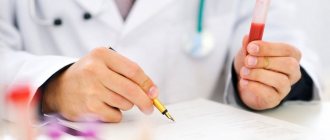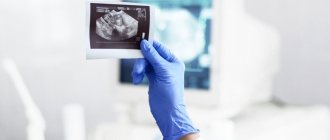Every woman who wants to get pregnant dreams of making sure that she will soon become a mother as early as possible. However, nature has decreed that it is impossible to find out about pregnancy immediately after the sperm fertilizes the egg. It takes some time before pregnancy can be diagnosed. When should you take a pregnancy test and will the test show 2 weeks of pregnancy? Can a pregnancy test immediately show pregnancy after a delay?
Two approaches to determining gestational age
When registering a woman, the antenatal clinic doctor calculates the duration of pregnancy, focusing on the date of the start of the last menstruation. It is from this day that a full-term pregnancy will be resolved by childbirth after 40 weeks, or 10 “obstetric months”. If we count the gestational age from the time the embryo is formed, it would be correct to count it from the middle of the cycle. Using this method, the time of ovulation is determined fairly approximately, because the menstrual cycle for different women has different durations.
From a “purely female” point of view, pregnancy should be counted from the day the expected menstruation is delayed. This logical opinion is based on the fact that a woman begins to guess about her condition when she discovers the absence of regular cyclic bleeding.
In order not to get confused in determining the timing, traditional methods of calculation are used:
- Obstetric method
– there is no pregnancy yet, the body is preparing for a possible conception. At 2 weeks the egg matures, and by the end of this period ovulation occurs. Women planning to conceive a desired child monitor the onset of ovulation.
- Embryonic method
– when counting the pregnancy period from the day of fertilization at the 2nd week, the embryo attaches to the endometrium, beginning its development.
Taking a pregnancy test
Not a single test, even the most accurate one, will show the presence of pregnancy in the 2nd obstetric week. There is no egg in the uterus yet, and the hormonal changes in the body to which the test strips react have not yet begun. The only possible independent study of your condition is an ovulation test. You can buy it at the pharmacy, or you can determine the date of ovulation by measuring your basal body temperature over several cycles.
Basal temperature is measured in the morning, at the same time, without getting out of bed. A woman measures her temperature with a thermometer placed in her mouth, vagina or rectum. During ovulation, there is a slight rise in temperature, literally by a few tenths of a degree.
If we calculate the gestational age using the embryonic method, then in the second week a pregnancy test will already be able to show a positive result. The approximate time frame for testing your condition is no earlier than 1-2 days before your expected menstruation.
Recommendations for using tests:
- A study conducted in the morning is considered the most accurate, although modern tests are valid at any time of the day without error.
- A one-time test may be erroneous, but a two- or three-time study conducted with a 2-3 day interval is always objective.
- It is advisable not to rush into using test strips; the optimal period is the first days after a missed period.
- According to the instructions for use, there is no need to evaluate the test result earlier than 10 minutes after the test - it is quite possible that the second strip will appear a little later.
- An expired test will not provide correct information.
If the embryonic method of calculating gestational age is taken as a basis, at week 2 the level of human chorionic gonadotropin (hCG) increases. A blood test for hCG will determine pregnancy with 100% accuracy. It is also possible for an experienced doctor to diagnose pregnancy by detecting a barely noticeable enlargement of the uterus.
How to get an accurate result
When to take a pregnancy test, each woman decides for herself. If there is already a delay in menstruation, then the time of diagnosis does not matter. When you want to do a test the very next day after conception, and you barely have the patience to wait 7-10 days after ovulation to examine the biomaterial for signs of pregnancy, then you need to adhere to certain rules:
- choose the morning time for testing (the first portion of urine after waking up contains a larger amount of human chorionic gonadotropin, since its growth occurs mainly at night);
- find a clean container to collect the material (if a tablet test or strip strip is used, the container must be clean, otherwise various liquid impurities may affect the test result);
- observe the time (the instructions for use indicate not only when you can take a pregnancy test, but also the time that you need to keep the strip strip in the biomaterial);
- correctly interpret the result (it is necessary to evaluate the test response within 3-5 minutes; most devices become uninformative after 10 minutes, and the reagent begins to appear on their surface).
Various disorders can affect the diagnostic result. For example, if you use the test in the evening and drink a lot of water beforehand, the answer will be skewed towards negative. For this reason, manufacturers of all devices unanimously recommend refraining from urinating 2-4 hours before diagnosis, and also not drinking liquid during this period of time. Under such conditions, the urine will be more concentrated, which will eliminate errors and false results.
Changes in a woman’s body at 2 weeks of pregnancy
At the 2nd obstetric week, the reproductive organs prepare for the possible placement of an embryo in the uterus. During the previous menstruation, the functional layer of the endometrium changed; the uterine mucosa is preparing for implantation.
Follicle-stimulating hormone influences the maturation of follicles in the ovaries. These are bubbles filled with liquid, each of which contains an egg. In any menstrual cycle, several follicles mature, but by week 2 a dominant egg is determined. It is this follicle that goes through all stages of maturation, the remaining cells undergo reverse development (atresia).
During an ultrasound, the dominant follicle can be seen without difficulty: it is larger than the others and is located on the surface of the ovary. Follicles stimulate the production of the “main female hormone” - estrogen. The more the dominant follicle grows, the higher the level of estrogen in a woman’s body. In response to an increase in the concentration of the hormone, a loose layer of the endometrium grows in the uterus to provide, if necessary, the implanted embryo with everything it needs.
Ovulation
On the 14th day of the cycle, due to a significant increase in estrogen levels, a sharp increase in the content of luteinizing hormone occurs. The dominant follicle ruptures, an egg comes out, ready for fertilization - ovulation occurs. Some women experience pain or discomfort during this period, while others do not feel ovulation at all.
Depending on the individual characteristics of the woman, the menstrual cycle may be longer or shorter. Consequently, ovulation does not occur on day 14, but earlier or later. The only regularity is that 14 days, or 2 weeks, always pass from ovulation to the end of the cycle.
Methods for determining ovulation:
- Measuring basal temperature - on the day of ovulation it increases, and during fertilization it does not change, remains at the same level. If a woman has measured her basal temperature for several cycles, she can accurately determine the time of ovulation and calculate the time of conception.
- Particularly sensitive women may notice pain in the lower abdomen, an increase in the volume of discharge (the effect of progesterone), and an increase in libido.
- Women with regular cycles that always last a certain number of days can use the calendar method of calculation. Following it, ovulation can be expected 14 days before the date of probable menstruation. For example, if the cycle is 29 days, ovulation occurs on the 15th day of the cycle.
- The pharmacy ovulation test is based on the reaction to luteinizing hormone found in the urine. The study is carried out in the morning, no earlier than 17 days before the expected menstruation.
Fertilization
Through the abdominal cavity, the egg moves into the fallopian tubes, in one of which fertilization occurs. The egg remains viable for only a day, sperm - 3-4 days. Thus, a woman’s fertility is observed on the day of ovulation and a few days before it.
In place of the dominant follicle after ovulation, a “corpus luteum” is formed, producing progesterone. This hormone stimulates a slight increase in temperature, favorable for the expected embryo, prevents other follicles from developing, and prepares the endometrium for implantation.
If the egg meets the sperm, fertilization occurs. The sperm produces a special enzyme that destroys the membrane of the egg. Thanks to this, it penetrates inside the egg, where the genes of the two cells are connected. As soon as the sperm has penetrated the egg, the structure of its shell changes, preventing “competitors” from penetrating inside.
At the end of the second obstetric week, ovulation and fertilization of the egg occurs in the female body.
Miscarriage
The fertilized egg is a foreign body for the female body, primarily due to male cells. And he tries to get rid of it, as he would do in any other case. However, nature is so wise that it has invented a special mechanism to prevent such an undesirable outcome of events: the blastocyst produces a special immunosuppressive protein that lowers the woman’s immunity, and as a result, her body cannot fight the “invader.”
But unfortunately, the embryo does not always win. There are a number of factors that can cause a miscarriage at 3 weeks of pregnancy. And one of them is alcohol.
How does a woman feel after conception?
Immediately after conception, a woman may feel absolutely nothing. If she did not plan a pregnancy, then in the normal rhythm of life she may not detect changes in her condition. If a woman planned her pregnancy in advance, she is more attentive to changes in well-being. It is quite possible that a signal of the onset of ovulation will be increased libido and an increase in the volume of discharge, weakness and a slight deterioration in mood.
Video about sensations, symptoms, signs of what is happening in the female body.
What is the 2nd week of pregnancy, monitoring ovulation, what happens during this process, measuring BC, determining the favorable time for conception, how antibiotics affect conception.
I have a stomachache
Among other things, at the 3rd week of pregnancy, a woman’s stomach already hurts (although not at all necessary): the lower abdomen is stretching, as before menstruation - the blastocyst is preparing a place for landing, as if scraping out cells from the uterine epithelium. Not everyone feels pain, but if you have a stomach ache at 3 weeks of pregnancy, you can only suspect the real cause if you strive for it for a very long time and try to look for signs of pregnancy in any changes.
Otherwise, the woman is confident: menstruation is about to begin, although this time it seems a little earlier than usual.
Discharge during and after ovulation
An egg white-like discharge or minimal bloody vaginal discharge indicates that a fertilized egg has already attached to the uterine wall. If the discharge is abundant, with blood, this is a symptom of endometrial hyperplasia, inflammatory diseases of the reproductive organs. Such symptoms, combined with fever and purulent leucorrhoea, are a reason to immediately consult a doctor.
The nature of vaginal discharge and the connection with possible diseases:
- Mucous, transparent, colorless and odorless discharge indicates the beginning of hormonal changes.
- White curdled discharge with flakes, accompanied by itching and burning - a sign of thrush. When treating the disease, you should warn your doctor about the possibility of pregnancy.
- Bloody discharge can normally be a sign of ovulation, or implantation bleeding, and has the character of scanty smears.
- Heavy bleeding with clots is another menstruation, a symptom of a genital disease or a sign of rejection of a dead embryo.
Painful sensations
At the 2nd obstetric week, particularly sensitive women may feel slight nagging pain in the lower abdomen. Occasionally they may radiate to the lower back. Mild sensations pass quickly and do not require medical advice. Most likely, this is a sign that the dominant follicle has burst and the body is preparing for ovulation.
If pain is noticeable at 2 weeks of pregnancy, calculated using the embryonic method, we can say with a high degree of probability that these are signs of rejection of the fertilized egg. If a woman did not plan a pregnancy, she will mistake these sensations for the beginning of menstruation. If such symptoms appear during a desired and planned pregnancy, you should consult a doctor.
The first signs of pregnancy at 2 weeks of embryonic period
The predominant influence of progesterone leads to hormonal changes in the body. It is manifested by mild weakness and nausea, mood changes, and a slight increase in body temperature.
Symptoms of early pregnancy:
- Changes in food habits, most often a craving for salty foods.
- Enlargement of the mammary glands, the appearance of their mild soreness;
- Delay in the onset of menstruation under the influence of progesterone, which prevents the rejection of the endometrium with the embryo implanted into it;
- A positive pregnancy test is valid from the first days of pregnancy.
A negative test result does not mean you are not pregnant. Most likely, the concentration of hCG in the urine is still too low. A test done 2-3 days later using a highly sensitive system may show a positive result. A high concentration of human chorionic gonadotropin in some cases does not indicate pregnancy, but the presence of hormone-dependent pathologies.
Video about conception and the first 2 weeks of pregnancy.
An interview with an obstetrician-gynecologist about how fertilization occurs and how a woman feels. Can I get my period during pregnancy? How to understand that pregnancy has occurred? What to do next when registering? Doctor's recommendations for expectant mothers.
Recommendations for future parents
Of course, issues of family planning and preparation for parenthood must be resolved long before such an exciting event, but it is better to start right now than never start.
If you have the slightest suspicion about your pregnancy, if you literally feel with your gut the emerging life inside you, then make every effort to preserve it and give the world this life healthy and happy. Many people do not know that the vast majority of miscarriages occur in the first trimester, namely in the first 4-7 weeks of pregnancy. Some doctors in district clinics have a tradition of not handing over the mother’s passport in the early stages for these reasons. To avoid this grief, contribute to this by changing your lifestyle and rhythm of life.
Spend more time resting and sleeping, walking, and moderate physical activity. Eat properly and in a timely manner, do not starve or overeat. Give up old habits and allow yourself more healthy and pleasant joys. That's the whole secret of success.
Sex at 2 weeks pregnant
Intimacy when planning pregnancy during this obstetric period will lead to the desired result. Before sexual contact, you should avoid alcohol, taking medications, and using local remedies (suppositories, suppositories, intimate gels, contraceptives, etc.). Fertilization specialists recommend that a woman lie down for a while after sexual intercourse, raising her legs and pelvis for more successful fertilization.
In order for the sperm to be of higher quality, it is advisable to abstain from intimacy 2-3 days before ovulation. If a woman does not determine the date of ovulation, and pregnancy is desired, it is better not to use protection during the entire fertile period and have sex every 2-3 days.
If the 2nd week of pregnancy is determined by the embryonic period, sex will not harm the unborn child, but too much sexual activity may have an undesirable effect on maintaining the pregnancy. A violent orgasm leads to intense contractions of the uterus, which creates the risk of rejection for an embryo that is not sufficiently attached to its wall.
Cold
From the very first weeks of pregnancy, you should not only lead a healthy lifestyle, but pay increased attention to your health in general. With a weakened immune system, you can easily catch a cold or the flu. This is now very undesirable. However, do not despair if you find out that you had a cold at 3 weeks of pregnancy. It is believed that for 18 days after conception, the unborn child is protected from exposure to harmful factors, including medications. Only after successful implantation does the egg begin to feed from the mother, having exhausted its reserves by this time.
If you already know about pregnancy at 3 weeks, then do not rush to diagnose yourself with ARVI. Perhaps this is how the first signs appear, which may include nasal congestion, cough and even fever.
attitude to alcohol
Drinking alcohol to stimulate mood and relieve nervous tension can lead to dire consequences. Alcohol does not always interfere with the process of egg formation, but its effect is difficult to calculate and can cause irreparable harm to the unborn child. Even low-alcohol drinks should not be consumed during pregnancy and planning.
In France, children born with congenital deformities and mental pathologies in the last century were called “children of Sunday,” that is, the fruits of a drunken conception. In the USSR of the 60-70s, when abortion was not welcomed at the state level, to carry it out it was enough to say that pregnancy was the result of conception while intoxicated.
Colds with fever
If a woman is planning a pregnancy, and at 2 weeks she discovers that she has a cold, she should not give up conception. At this time, the egg is still autonomous and is not exposed to drugs, although they should still be taken with caution, giving preference to safe drugs.
At the 2nd week of the period determined by the embryonic method, a cold should not be ignored; it should be treated under the guidance of a doctor. The specialist must be aware of the existing pregnancy.
Analyzes
If your pregnancy was diagnosed so early, some tests may be scheduled for you now. In particular, an analysis for hCG at the 3rd week of pregnancy will show how it develops (that is, whether it has occurred accurately), will help determine the duration of pregnancy and predict the number of embryos - it proportionally affects the level of hCG in the blood serum.
In addition to hCG, the corpus luteum continues to synthesize progesterone, also called the pregnancy hormone. Progesterone prepares the uterus for the settlement of an embryo and affects the nervous system of the expectant mother, creating the most favorable conditions for the preservation and development of pregnancy, therefore, at the slightest risk or threat, the woman will be referred for this analysis.









